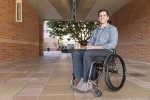Derek Herrera was in combat when a sniper’s bullet struck him on a Special Operations mission in Afghanistan in June 2012.
“It’s inherently risky what we do (in the military),” Herrera said. “That’s one of the reasons the experience is so memorable and meaningful.”
The sniper’s bullet left Herrera, now a student in Anderson School of Management’s executive business program, paralyzed and unable to continue his military service. Until that injury, he said he had planned to be a career Marine his entire life, and hadn’t considered other possibilities he could pursue.
“I was going to stay in until they kicked me out,” Herrera said.
During his recovery, Herrera tried to focus on keeping positive and looking to his future. He said he thought about starting his own company or going to business school, as well as working through his injury.
While in rehabilitation, Herrera said he learned about ReWalk, an exoskeleton that enables paralyzed people to walk, when he was first recovering from his injury in Florida. The hospital he was at had a few of the devices, but it was too early on in his rehabilitation to use it, he said.
Herrera continued to pursue the device once back in California. After a few months of talking with doctors and the ReWalk company, he said he was the first to buy one in the U.S.
Now Herrera said he uses ReWalk almost every day, though it is not a replacement for a wheelchair. He said he can’t use it 100 percent of the time, but tries to use it everyday.
As he worked through his recovery, he said he started brainstorming about ways to move forward with his life outside of the military. He thought of different paths he could take to make an impact.
“What I have found is I can be as passionate about other things, and making an impact in the business world,” Herrera said.
He said he got the idea to apply to Anderson because a few friends were going back to school, and one friend attending Anderson invited him to take a look around UCLA. He started in fall of 2013, 15 months after his injury.
Now at Anderson, his peers and teachers alike said they think he is excelling and is a role model for other students.
Eric Leskly, a friend and classmate of Herrera’s, said they met fall of last year in their study group and became friends. He said he thinks Herrera is brave and focused in his work and personal life.
Leskly said he saw Herrera use ReWalk for the first time when he demonstrated it at a fundraiser for Technion-Israel Institute of Technology, which developed the system.
“There’s something about seeing him use it in person, and hearing him talk about his career and how he got injured in Afghanistan, it was really amazing,” Leskly said.
Associate Dean of Executive Education Programs Kelly Bean said she is a proponent of active duty members and veterans in the classroom. She said she has spoken with Herrera about his leadership and what he wants to do with his degree.
“Derek brings a humbleness with him and a sense of innovation and entrepreneurship, and a sense of action,” Bean said. “He likes to get things done.”
After he spent his first year at Anderson, Herrera became CEO of RuckPack, an energy and nutrition substitute, in July 2014.
He said he hopes to demonstrate business leadership through his position at RuckPack and by starting his own company in the next five years.
Sylvia Haas, director of admissions for the executive masters of business administration program ,said she thinks Herrera is an example to other students at the business school because of his leadership. Haas said she thinks his attitude is one of the reasons he was chosen to speak to the new executive MBA class this fall.
“Anyone would want him on their team,” Haas said.
Email Kovarik at ckovarik@media.ucla.edu.
